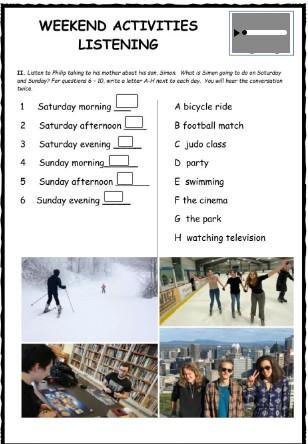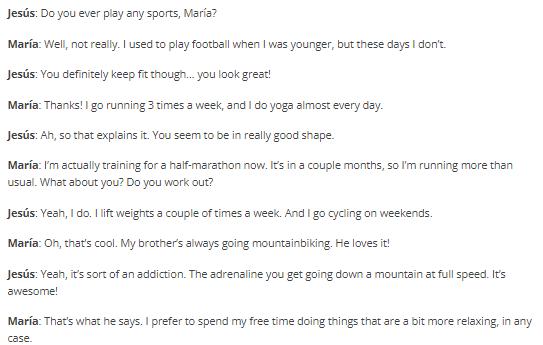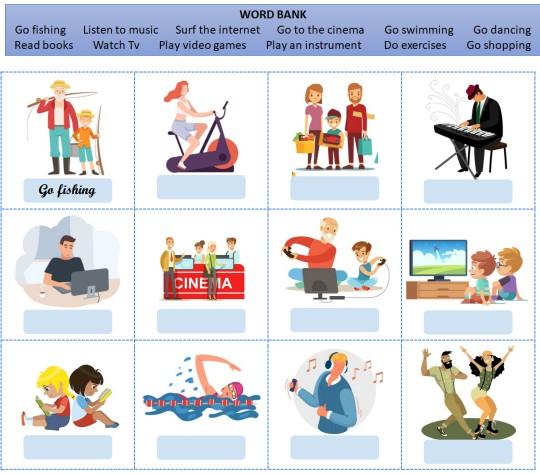Didactic Unit Template

Teacher in training: Karen Julieth Tellez Acosta
Title of the Unit: Leisure time
Contextualization: Grade 3-2 is a small course, like all the other courses in the institution, since it only has 15 students, which makes the teacher and themselves work very well, dedicating the necessary time needed by each explanation of the subject, socialization with the students about it and the activities to be carried out. In addition, they range in age from 9 to 10 years, so little by little they understand the importance of the study and of the different specific topics; and have an A1 level in the English language.
Justification: I found it pertinent to teach this topic to students in grades 3-2 mainly to expand their English vocabulary, but in addition to this, that they can create sentences considering the correct structure. On the other hand, teaching this topic will allow them to practice all the language skills, and thus improve their level of English little by little. For this reason, Total English (2014) mentions that "English vocabulary is essential for learning and teaching the English language, since without sufficient vocabulary knowledge people cannot understand others or express their own ideas" (p.1).
Organization of the Didactic Unit: Number of sessions: 3
Reason: This number of sessions was decided because, for students to fully understand the subject, it is necessary to study each of the skills with time and without haste.
General Objective
Learn vocabulary about leisure time and how to write sentences about it considering the correct grammatical structure.
Specific Objectives Understand what activities can be done in free time.
Know how to write and pronounce
Subject Content
sentences according to leisure time activities.
Understand the pronunciation of the new vocabulary.
Vocabulary about activities carried out during leisure time.
Grammatical structures to write or pronounce sentences considering the main theme.
Audios to practice listening to the new vocabulary.
Language Content / Communi cation
Vocabulary
The vocabulary that will be practiced in the English class will be the following:
Go camping.
Go fishing.
Go for a bike ride.
Go for a walk.
Go out for a drink.
Go out for dinner.
Go shopping.
Go to a concert.
Go to a party.
Go to the beach.
Go to the cinema.
Go to the park.
Listen to music.
Play computer games.
Play sport.
Read
Surf the Internet.
Visit a museum.
Visit an art gallery.
Visit friends.
Watch a movie.
Watch a sporting match.
Watch sport on TV.

Watch TV.
Structures
Verb to be, ask "What do you like to do in your free time?", answer the questions.
Language skills / Discourse type
Examples:

What do you like to do in your free time?
- I like reading, dancing, listening to music and watching television.
I love cooking pancakes in my house.
Writing, speaking, listening, and reading skills will be practiced in the different class sessions. First it will be writing and reading; in the next session, listening and speaking skills will be discussed; and in the third session all will be practiced. For all this, different activities will be carried out so that they can dialogue, unite, listen and so on.
Activities Session 1: Writing and reading.
Warm – Up stage (pre): The teacher comes to the classroom, greets the students, and explains to them what the subject to study in the next classes will be, which will be about leisure time. She tells them that they will do different activities to practice all the language skills.
Presentation stage (pre): After having mentioned the subject to study; the teacher will teach them the new vocabulary and they will copy it in their respective notebooks, and then each student will write three texts in which they mention the activities that they do in their free time during the week, weekends, and vacations.
Practice (while): After that, each student will read two texts where various leisure time activities are mentioned. Then, each of them will mention what she understood of it and what leisure activities she recognized.
Production (post): Each student must make a comic of at least 9 drawings where they specify
which are the leisure activities that she loves to do the most when she has enough time. For this, she must create sentences in English, and write them under each drawing as appropriate.
Assessment (post): The teacher will ask them to write on a separate sheet all the vocabulary they have learned to know if they remember what they learned in class or not.

Session 2: Listening and speaking.
Warm – Up stage (pre): The teacher will teach them the new vocabulary in an audio, and they will copy in their respective notebooks what the pronunciation is like. Then he explains to them that they will carry out some activities to strengthen listening and speaking.
Presentation stage (pre): After that, all students will listen to an audio about leisure time activities and will identify what they are, but they will have to pronounce them correctly.
Practice (while): Each student will have at their disposal a guide that they will have to complete by listening to an audio. The activities are based on circling the correct activity as mentioned in the audio.
Production (post): Students will be organized in groups of two. One of them will ask the other what he does in her spare time, and the other person will answer correctly. After this, they will exchange roles.
Assessment (post): The students will listen to a random audio set by the teacher, and they will have to mention a sentence considering that specific activity.
Organization and class distribution / timing
Session 3. Listening, speaking, writing, and reading.
Warm – Up stage (pre): The teacher comes to the classroom and gives them a brief review of the vocabulary and sentences with questions and answers to practice all the language skills with different activities.
Presentation stage (pre): After that, each student will have a guide that contains some drawings; What they will do is write under each drawing what the activity is.
Practice (while): Each student will listen (and will not be able to see the notebook) the activities that are carried out in leisure time, and they will have to say which ones are mentioned correctly in the audio.
Production (post): Each student will conduct an interview with 3 classmates. She will ask them what activities they do in their free time and write everything they tell her in the notebook.
Assessment (post): Considering the previous activity, the students will be organized in a group of 4 and will do a play or roleplay, in which they will have to talk as if they were lifelong friends and will ask and answer each other about the activities they did in vacation.
Methodology
Session 1: Writing and reading.
Warm – Up stage (pre): 5 minutes
Presentation stage (pre): 10 minutes
Practice (while): 10 minutes
Production (post): 25 minutes

Resources / Materials
Assessment (post): 10 minutes
Session 2: Listening and speaking.
Warm – Up stage (pre): 5 minutes
Presentation stage (pre): 15 minutes
Practice (while): 10 minutes
Production (post): 25 minutes

Assessment (post): 5 minutes
Session 3: Listening, speaking, writing, and reading.
Warm – Up stage (pre): 10 minutes
Presentation stage (pre): 10 minutes
Practice (while): 10 minutes
Production (post): 20 minutes
Assessment (post): 10 minutes
Activity for listening:
Activity for reading:

Activity for listening:







Evaluation (criteria and instruments)
Assessment criteria.
Writing and speaking fluency. (10%)
Understand the audios in English and the readings. (twenty %)
Understand what classmates say when they speak and know how to respond. (10%)
Know how certain words are written and know how to formulate sentences. (10%)

Active participation in class. (10%)
Final exam. (40%)
Daily work. (20 %)
Assessment tools
Rubric to evaluate the writing of the activities that are carried out in leisure time, in addition to the writing of a dialogue between two people having a conversation about leisure time.
Rubric to evaluate listening and speaking about leisure time; identify new vocabulary and use it in different sentences.
Rubric to evaluate the four skills, where they can and know how to use the vocabulary, considering the questions and answers with the appropriate structure.
Final exam.
References:
Estherlee76. (n.d). Weekend activities listening. Liveworksheets.
https://www.liveworksheets.com/worksheets/en/English_as_a_S econd_Language_(ESL)/Free_Time_activities/
Weekend_Activities_Listening_KET_level_ci1971167ej
Estherlee76. (n.d). Weekend plans listening. Liveworksheets.
https://www.liveworksheets.com/worksheets/en/English_as_a_S econd_Language_(ESL)/Free_Time_activities/ Weekend_Plans_KET_listening_om2080199bs
Madrid Inglés. (n.d). The best blog to learn English.
https://madridingles.net/conversaciones-tiempo-libre/

Mineducation. (n.d.). Beyond the classroom english self-study guide.
https://eco.colombiaaprende.edu.co/wp-content/uploads/2021/0
7/7_BOG1_GA1_YA-JB-ML_2020.pdf
Total English (2014). English Vocabulary – Definition and Importance of Vocabulary.
https://www.inglestotal.com/vocabulario-eningles-definicion-e-importancia-de-vocabulario/#:~:text=El %20vocabulario%20en%20ingl%C3%A9s%20es,o %20expresar%20sus%20propias%20ideas.
